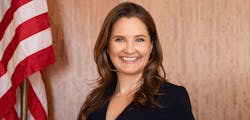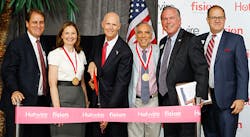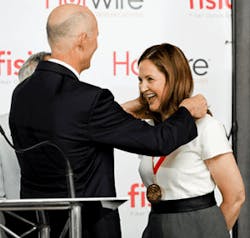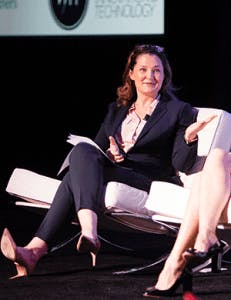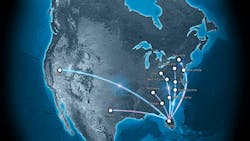Executive Insights With Kristin Karp President and CEO of Hotwire Communications
Sharon Vollman, ISE: Tell us the story of how and why you co-founded Hotwire Communications.
KristIn Karp: Before founding Hotwire Communications, we owned a phone company. One of the lessons we learned before we sold that company is that if you don’t own the network, you aren’t truly in charge of things like setting timeframes for delivery or the quality of service your customer receives. When we founded Hotwire, being able to own the network was important to us so we could have that level of control and ensure our customers were receiving the highest quality service.
When we looked at what was available in the market at the time, we quickly realized 2 things. First, that there was a niche in the market for providing high-quality Internet services to gated, retirement-style, and golf communities, and second, that bandwidth was going to be the predominant product going forward. Fiber was the clear technological choice to support that, so we started the company based on the principle of providing fiber-to-the-home and fiber-to-the-unit, as well as ensuring a personal approach to customer service that matched the high quality of our core product.
This meant that we would take the best approach to our services, as opposed to cutting corners and choosing an easier or cheaper solution. When we first started installing 1 Gigabit modems in Florida communities in 2005, that was not only unheard of at the time, it’s still state-of-the-art today. That dedication to finding the best solutions for our customers is at the core of the company, and it has guided everything we do from our founding onwards.
InvisiLight® Solution for Deploying Fiber
April 2, 2022Go to Market Faster. Speed up Network Deployment
April 2, 2022Episode 10: Fiber Optic Closure Specs Explained…
April 1, 2022Food for Thought from Our 2022 ICT Visionaries
April 1, 2022ISE: Share the advantages and disadvantages to being privately funded.
KristIn Karp: Being privately funded means that we have the flexibility to be able to scale at our own pace, which allows us to move forward when we feel it’s right rather than because we need to. This applies to growing our network, expanding our service imprint, and increasing the number of customers we serve. Because we control the pace at which we scale, we’re never scaling too much or too little — it’s always just right.
As an entrepreneur, I have an inherent sense to see an opportunity and want to pursue it. But as a business owner and operator, I don’t have the pressure to pursue opportunities before we’re ready to do so. This way, we’re nimble enough to be able to pause and review the value of a new opportunity from all angles, such as technically and financially, and determine whether it’s the right fit for us as a company. This selectiveness also means that every new business lateral we open receives the high-quality level of customer service that has come to define us as an organization.
(L-R) Former City of Fort Lauderdale Mayor Jack Seiler, Hotwire Communications President & CEO Kristin Karp, former Florida Governor Rick Scott, Hotwire Communications Chairman Michael Karp, Greater Fort Lauderdale Alliance President Bob Swindell, Paul Martilla of Enterprise Florida, attending the ribbon-cutting ceremony of the Hotwire Communications headquarters in 2016.
ISE: Share the strategy of having one dedicated technician for each property you serve. That means you must train your techs in both hard AND soft skills.
KristIn Karp: I always like to say that customers choose us because of our technology, but they refer us because of our customer service. One of the things that we felt was lacking in the telecommunications industry was that companies often didn’t put their customers first, so we strive to go the extra mile to ensure that our customers always feel listened to and looked after. A huge part of that is making sure they have somebody available who understands the needs of their community, who knows the residents and the layouts of the homes, somebody whom they can really get to know and build a relationship with.
This makes it important to train our technicians in both hard and soft skills, so that when our techs deal with a problem, they don’t just treat it as a technology issue that exists in a vacuum, but as something that’s affecting people who might be feeling frustrated or confused. Having somebody who doesn’t just understand what our customer’s problem is and how to fix it, but understands and cares about how it’s affecting them, is very important in being able to provide the kind of "people first" customer service we saw missing from the industry.
ISE: Hotwire’s services are intended to be highly accessible, meaning that older generations and the less computer-savvy aren’t excluded from enjoying the full benefits of high-speed broadband.
KristIn Karp: I think there’s an unfortunate myth that the older generations don’t like technology. My own grandmother, who was 95-years-old when she passed away, was on the Internet every day playing "Words with Friends" with my brother and facetiming with friends and family.
Our older customers are very technologically sophisticated, they understand bandwidth, and they have a demand for quality service. We also want to make sure they know how to use the technology. So, we have trainers that go into the communities after installation and help teach residents how to use our services. Afterwards, we find there is usually a computer club or technology club at the community where residents continue training and educating themselves.
Hotwire Communications President & CEO Kristin Karp discussing the future of Women in Technology onstage at eMerge Americas 2018.
ISE: How can providers work with their communities to help them develop comprehensive smart initiatives? Share your greatest learnings about smart communities and telecom providers’ interconnected relationship. How does it need to change in the future?
KristIn Karp: Now and in the coming years, telecommunication providers need to strongly advocate for the integration of Smart City solutions and the proliferation of fiber optics networks, which will be essential and necessary for the successful widespread adoption of 5G. Within our own company, Hotwire Communications has been helping cities within Florida, such as Plantation and Miami Beach, prepare their local communities for Smart City technology integration.
This integration will need to be the result of a relationship between telecommunication providers and the communities they serve, one which takes the unique needs of those communities and their residents into account in order to tailor-make an initiative that suits those needs. A "one-size-fits-all" approach won’t be appropriate, as every community is different, but each plan will have to be built upon the 2-way understanding that a robust fiber network is critical in allowing for the benefits of Smart City technologies to be achieved.
ISE: What emerging or disruptive technology excites you the most for the Information and Communications Technology industry? Why?
KristIn Karp: One of our major initiatives over the past few years has been to turn Hotwire into a green company, eliminating paper billing, and switching to largely paperless communications, both internally and externally. Conservation is very important to us, and I’m excited by how we can use fiber to better the environment. Focusing on fiber cabling reduces the need for copper, and provides a future-proof, long-lasting solution that reduces energy consumption, and, correspondingly, reduces carbon emissions.
I’m also very excited by the introduction of Smart Car technology. The adoption of 5G over the next few years will only allow for the technology to become more widespread, and apart from being a truly amazing technological innovation, will eventually lead to safer traffic flows once it becomes more common.
ISE: Share the changes you are most proud of related to diversity and inclusion at Hotwire.
KristIn Karp: Today, women hold more than 50% of the jobs in the United States, but only 12% are engineers. We need more women to fill those STEM positions and roles within companies. I am committed to hiring female engineers and giving new or recently graduated college students the opportunity to become technology leaders through internships and job opportunities.
ISE: What professional and leadership guidance would you offer a younger Kristin as she was forging her career path?
KristIn Karp: If I had the chance to speak to a younger version of myself, I would tell that 22-year-old South Dakota girl the same thing I tell my new college graduate daughter: There’s nothing in this world that is impossible for you to achieve. Surround yourself with people who care, and who aren’t afraid to take the risks with you. Finally, always be humble enough to learn something new, because you never know where it might take you.
ISE: What is the most interesting thing about your role? What would you recommend to someone who wants to achieve a high-level position in their career?
KristIn Karp: The first 2 employees I hired when I co-founded Hotwire Communications are still with me today, and continue to be instrumental for the continued growth and success of the company. Hiring them at the start has influenced who I’ve hired since. It’s taught me that it’s important to find people who believe in the mission, and then get out of the way and let them do what they do best. Picking the right people, people who care about what we’re doing and about our customers, then giving them the opportunity to shine and the freedom to do the right thing, is key to the culture we’ve built at Hotwire Communications.
ISE: What is the greatest myth about being a CEO?
KristIn Karp: The greatest myth about being a CEO is that you get to be in charge of people. The role is about leadership, and that means enabling and empowering your employees and everyone else around you. Your job is to constantly define the path, readjust your methods and practices, and remove obstacles that stand in the way of your employees so they can accomplish everything they’re capable of.
ISE: What is something you’d be happy doing every day for the rest of your career?
KristIn Karp: One of the things that my family has been very involved with is making sure that there are good options and opportunities for kids as they come out of high school. We run a low-income school outside Philadelphia, and one of the things we make sure of is that there are vocational and other educational opportunities. This provides students who might not be a good fit for college to still have access to jobs that will provide them with a very well-paying career.
Here are Hotwire Communications, we’re collaborating with the Broward Community College to create a track where kids and young adults who are coming out of high school or are already enrolled in community college can learn and participate at Hotwire as interns, then go to Broward Community to get a degree in fiber certification. Afterwards, they would have the opportunity to work at Hotwire or at other technology companies, and by giving them access to that training you’re helping to provide the next generation of jobs.
ISE: Share a quote from someone who inspires you.
KristIn Karp: "All our dreams can come true, if we have the courage to pursue them." –Walt Disney
There’s no room in success for fear. Keeping this in mind helped me to take risks that other people probably thought I shouldn’t have taken, but taking those risks, and giving myself room to learn and grow, has allowed me to thrive in an ever-evolving industry.
ISE: What do you do to help create a work/life balance in your life?
KristIn Karp: I love reading books about health and nutrition, or books on leadership. I set aside time for meditation every day and try to take a long walk in the morning or even a quick 20 minutes of quiet just to center my thoughts. Setting aside this time for quiet introspection allows me to focus the rest of the day. It’s something I want to get better at, as it takes dedication and practice, but I’m committed to it because I think the benefits align well with the needs and responsibility of leadership.
Like this Article?
Subscribe to ISE magazine and start receiving your FREE monthly copy today!
I surround myself with people whom I admire, whom I can learn from and share this journey with. I am part of a group of successful female CEOs, and over the years we’ve become friends, mutually supporting and mentoring each other. Having a support system like that, comprised of people who have a firsthand understanding of the challenges and triumphs you’re experiencing, is invaluable.
I make it a point to take an active part in several boards, all of which give me an up-close perspective of the challenges and opportunities of other businesses, but also of the needs of the community as a whole. This provides an opportunity to align our purpose as a company and corporate citizen.
About the Author
Sharon Vollman
Content Ambassador for ISE EXPO
Sharon Vollman is the Content Ambassador for ISE EXPO. She is passionate about collaborating with thought leaders, SMEs and hard-working doers who design, plan and deploy ultra-reliable broadband networks. Vollman is committed to creating a variety of educational offerings for ISE EXPO attendees that inspire them to connect every U.S. citizen with the broadband networks we all want for our children and grandchildren.
Vollman has created educational partnerships with Broadband Service Providers including AT&T, Verizon, Lumen, Frontier Communications and others. She has covered the telecom industry since 1996.
